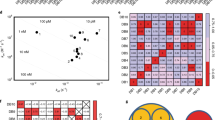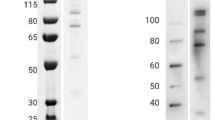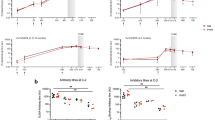Abstract
A prerequisite for an antigenically defined vaccine against malaria is the identification of parasite antigens which are necessary or sufficient for the induction and expression of host-protective immunity. As malaria infection in man can be treated by passive transfer of serum or immunoglobulin from adults in an endemic area1 it is reasonable to propose that sera from clinically defined patient groups and functionally defined immunoglobulin may be used as probes to identify the relevant parasite antigens involved in host protection (‘host-protective antigens’)2 We have now purified immunoglobulin from a large number of individuals living in the endemic area, tested for inhibitory effects on in vitro growth of Plasmodium falciparum originating from the same area, then examined antibody specificities by immunoprecipitation analysis with biosyntheti-cally labelled proteins of blood stages of the parasite. Two-dimensional gel analysis of immunoprecipitates revealed a correlation between inhibition of parasite growth and increased antibody binding to two proteins of molecular weight (Mr) ∼96,000.
This is a preview of subscription content, access via your institution
Access options
Subscribe to this journal
Receive 51 print issues and online access
$199.00 per year
only $3.90 per issue
Buy this article
- Purchase on Springer Link
- Instant access to full article PDF
Prices may be subject to local taxes which are calculated during checkout
Similar content being viewed by others
References
Cohen, S., McGregor, I. A. & Carrington, S. C. Nature 192, 733–737 (1961).
Knopf, P. M., Brown, G. V., Howard, R. J. & Mitchell, G. F. Aust. J. exp. Biol. med. Sci. 57, 603–615 (1979)
Brown, G. V., Anders, R. F., Stace, J. D., Alpers, M. P. & Mitchell, G. F. Parasite Immun. 3, 283–298 (1982).
Jensen, J. B. & Trager, W. J. Parasit. 63, 883–886 (1977).
Kessler, S. W. J. Immun. 115, 1482–1490 (1975).
Laemmli, U. K. & Favre, M. J. molec. Biol. 80, 575–599 (1973).
O'Farrell, P. H. J. biol. Chem. 250, 4007–4021 (1975).
Brown, G. V., Coppel, R. L., Vrbova, H., Grumont, R. J. & Anders, R. F. Exp. Parasit. 53, 279–284 (1982).
Wilson, R. J. M. & Phillips, R. S. Nature 263, 132–134 (1976).
Reese, R. T. & Motyl, M. R. J. Immun. 123, 1894–1899 (1979).
Butcher, G. A. & Cohen, S. Immunology 23, 503–519 (1972).
Campbell, G. H., Mrema, J. E. K., O'Leary, T. R., Jost, R. C. & Rieckman, K. H. Bull. Wld Hlth Org. 57, Suppl. 1, 219–215 (1979).
Perrin, L. H., Ramirez, E., Lambert, P. H. & Miescher, P. A. Nature 289, 301–303 (1981).
Author information
Authors and Affiliations
Rights and permissions
About this article
Cite this article
Brown, G., Anders, R., Mitchell, G. et al. Target antigens of purified human immunoglobulins which inhibit growth of Plasmodium falciparum in vitro. Nature 297, 591–593 (1982). https://doi.org/10.1038/297591a0
Received:
Accepted:
Issue Date:
DOI: https://doi.org/10.1038/297591a0
This article is cited by
-
Evaluation of antibody responses to the early transcribed membrane protein family in Plasmodium vivax
Parasites & Vectors (2019)
-
Plasmodium falciparum merozoite surface antigen-specific cytophilic IgG and control of malaria infection in a Beninese birth cohort
Malaria Journal (2019)
-
Characterization of anti-EBA175RIII-V in asymptomatic adults and children living in communities in the Greater Accra Region of Ghana with varying malaria transmission intensities
BMC Immunology (2018)
-
Maternal-foetal transfer of Plasmodium falciparum and Plasmodium vivax antibodies in a low transmission setting
Scientific Reports (2016)
-
Comparative analysis of the profiles of IgG subclass-specific responses to Plasmodium falciparum apical membrane antigen-1 and merozoite surface protein-1 in naturally exposed individuals living in malaria hypoendemic settings, Iran
Malaria Journal (2015)
Comments
By submitting a comment you agree to abide by our Terms and Community Guidelines. If you find something abusive or that does not comply with our terms or guidelines please flag it as inappropriate.



